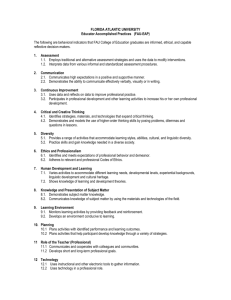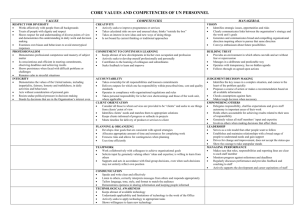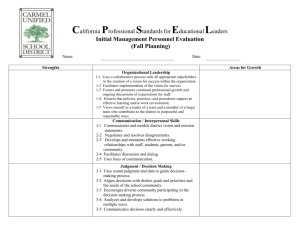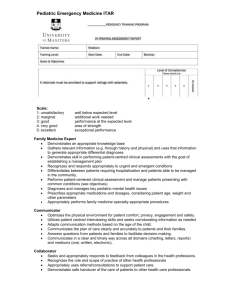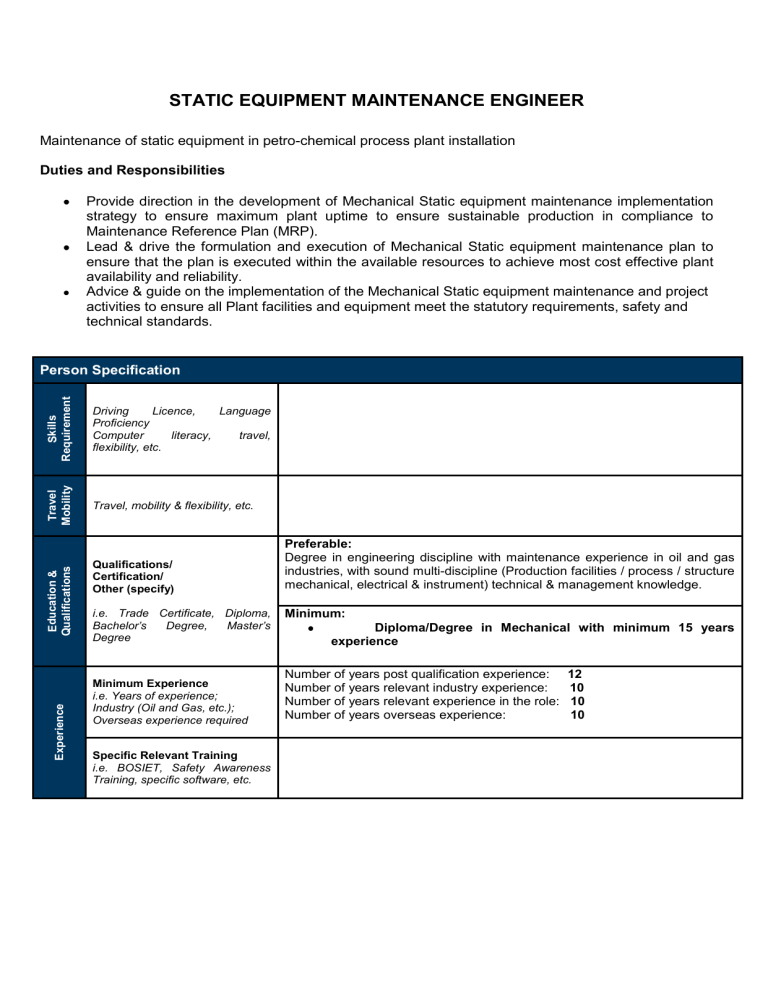
STATIC EQUIPMENT MAINTENANCE ENGINEER Maintenance of static equipment in petro-chemical process plant installation Duties and Responsibilities Provide direction in the development of Mechanical Static equipment maintenance implementation strategy to ensure maximum plant uptime to ensure sustainable production in compliance to Maintenance Reference Plan (MRP). Lead & drive the formulation and execution of Mechanical Static equipment maintenance plan to ensure that the plan is executed within the available resources to achieve most cost effective plant availability and reliability. Advice & guide on the implementation of the Mechanical Static equipment maintenance and project activities to ensure all Plant facilities and equipment meet the statutory requirements, safety and technical standards. Skills Requirement Travel, mobility & flexibility, etc. Experience Education & Qualifications Driving Licence, Language Proficiency Computer literacy, travel, flexibility, etc. Travel Mobility Person Specification Qualifications/ Certification/ Other (specify) i.e. Trade Certificate, Diploma, Bachelor’s Degree, Master’s Degree Minimum Experience i.e. Years of experience; Industry (Oil and Gas, etc.); Overseas experience required Specific Relevant Training i.e. BOSIET, Safety Awareness Training, specific software, etc. Preferable: Degree in engineering discipline with maintenance experience in oil and gas industries, with sound multi-discipline (Production facilities / process / structure mechanical, electrical & instrument) technical & management knowledge. Minimum: Diploma/Degree in Mechanical with minimum 15 years experience Number of years post qualification experience: Number of years relevant industry experience: Number of years relevant experience in the role: Number of years overseas experience: 12 10 10 10 Competency Guidelines COMPETENCY LEADERSHIP The ability to motivate others to achieve personal and organisational goals. The ability to take a role as leader of a team or other group. It implies a commitment to lead others and help to develop and motivate the performance of others individually or in a team capacity. MANAGEMENT LEVEL (A) Contributes to long term vision & strategic direction, gaining support and buy in form all parties involved. Willing to assume a role of leadership and control when appropriate authority is given. Takes immediate and appropriate action in a crisis. Relates honestly to others and expresses feelings openly in order to build trust and confidence in own abilities. Sets clear objectives for the department and effectively allocates responsibilities to the teams. Delegates appropriately feeling of ownership. COMMUNICATION The ability to listen, explain, persuade, convince and influence others by expressing views effectively, appropriately and accurately. The ability to persuade and convince others to take actions and to clearly identify and understand situations and then respond appropriately. Clearly conveying information and ideas to individuals or groups in a manner that helps them understand and retain the message. TEAMWORK The ability to work with and support others as part of a team, build maintain relationships, enabling the promotion of information sharing, achievement of goals, as well as enabling effective handling of disagreement and conflict, the ability to work in teams and place team goals above individual interests. Facilitating sharing of ideas, information and responsibilities. Supporting and leading the team towards achieving a common goal. to generate Works with the team to set clear objectives that team members can relate to and feel motivated to achieve. Acts as an advocate for the team. Handles conflict in a constructive way and encourages other to do the same. Leads by example; displays behaviour which reflects the desired work norms and values. Sets clear direction and targets to enable the department division to meet the overall objectives. Is appreciable, professional. Communication is delivered persuasively, with impact and energy, adapting style to target audience. Communicates Cleary and concisely. Prevents arguments and ensures focus is maintained throughout discussions. build relationship and is Encourages two –way communication; confirms that the message has been understood and seeks feedback. Seeks a win/win solution to conflict resolution. Moderates tone, language and content of any communication to the level of individual or group. Drives good cross departmental communications and seeks opportunities to improve the flow of information. Uses variety of methods to ensure open lines of communication such as monthly reports, briefing sessions and regular meetings. Is able to produce well researched, constructed and targeted written documents. Ask questions to check that he/she has understood others. Role models effective and persuasive communication strategies to overcome resistance. Persuades or influence others to gain buy in for recommendations or ideas. Communicates clear team goals and objectives. Criticizes constructively and seeks to suggest ways to improve overall efficiency. Is open to receiving criticism. Identifies and resoles causes of conflict and resistance. Encourage others to share views. Focuses the team efforts on the process, the outcomes and alignment to department stagey. Uses position and authority in a fair manner within the team. Recognises the impact of different cultures on business practises and diplomatically handles the need to educate misguided customers. PROJECT PLANNING Accurately scopes out length and difficulty of tasks and projects; develops schedules and task /people assignments; anticipates and adjusts for problems and roadblocks; measures performance against goals; evaluates results. SUPERVISORY / JUNIOR MANGEMENT LEVEL (B) Understands business procedures and policies of other departments and uses this knowledge to enhance planning and organising efforts in own project. Identifies and recommends necessary resources to enable to achievement of projects and day to day operations. Constructs effective contingency plans. Monitor the progress of projects, checking if frames and quality standards are met. Leads a consultative approach to the translation of strategic objectives to project plans. Listen attentively to other people. Demonstrates respect for others. Works productively with a broad range of individuals, including those of different levels, jobs, backgrounds. Shares information and own expertise with others to enable them to accomplish team goals. Empathises and makes self available to internal and external customers to resolve their issues. Values and acknowledges the input and knowhow of other team members. Understands the overall project goals and works selflessly with the team towards achieving their goals. Effectively manages time. Adopts a methodical and systematic approach. Sets appropriate priorities to ensure deadlines, key performance indicator and targets are met. Actively conducts daily /weekly planning of achievement of results. Knows the status of own project and updates others accordingly. ORGANISING Can muster resources (people, funding, material, support) to get things done; can orchestrate multiple activities at once to accomplish a goal; uses resources effectively and efficiently; arranges information and files in a useful manner. Handles multiple projects simultaneously and efficiently, delegating tasks to efficiently and continually move projects forward. Recruits groups and resources to achieve lofty goals with extreme adeptness. Tackles multiple complex projects and directs operation concurrently and smoothly; communicates expectations to organization and builds in accountability measures. Maintains accurate and complete records, and develops organizing systems / processes. MANAGING OTHERS Ability to lead others in a vigorous and positive way; Is good at establishing clear directions; sets stretching objectives; distributes the work load approximately; lays out work in a well-planned and organised manner; maintains two way dialogue with others on work and results ;bring out the best in people is a clear communicator. Sets high specific goals to team members. Works to ensure team exceeds objectives but not at all the expense of the other teams or wider goals. Offers maximum support and direction to team and its members Promotes team morale and productivity. Building team spirit and ensures team works well in the event of pressure etc. Can coordinate effectively between team members and solve team problems. Provides coaching, training and guidance. PROBLEM SOLVING Identifying problems by conducting logical, factual and clearly reasoned analysis. Understanding problems by breaking them into smaller parts and identifying risk-return implications in a systematic way. Making logical comparisons of possible outcomes and coming up with the best possible solutions to problems. Looks beyond the obvious and analyses alternate solutions considering the risks and likely consequences. Promotes and demonstrates the use of data and facts when problem solving. Makes effective and timely decisions in difficult, complex and pressured situations. Incorporates the bigger, inert departmental implications when evaluating information. DECISION MAKING The ability to make decisions quickly and accurately with incomplete information and under tight deadlines and pressure. Taking logical and reasoned decisions. Sought out by others for advice and solutions. Enlists resources (people, material, funding, support) to get things done efficiently. Orchestrates multiple accomplish a goal. activities Directs and channels people material to accomplish goals. to and States agendas and objectives, controls times, ensures everyone contributes to meetings. Deals with all team members. Recognises individual performance, recommendations or ideas. Let’s people know what is happening and communicates effectively. Makes sure team has all necessary information and support. Promotes team model. Structures information in a logical order. Breaks down a task into a number of smaller steps and organises each part systematically. Seeks out new information and information and identifies problems (thinking outside of the box). Uses both analytical and techniques to solve problems. creative Solves problems in spite of limited or vague information. Actively seeks out and evaluates information, analyses the fact from different angles and selects the best option. Uses sound Judgement to anticipate potential implications of all decisions balances benefits and risks. Promotes and demonstrates the use of data and fact when making a decision. Questions information suspect or illogical. Makes sound and timely decisions even in the absence of all necessary information. Leads discussions to final decision. Leads discussion to a decision. NEGOTIATING Can negotiate skilfully in tough situations with both internal and external group; can settle differences with minimal noise; can win concessions without damaging relationships, can be direct and forceful as well as diplomatic; gains trust quickly of other parties to the negotiations; has good sense of timing. Keeps accurate and current records in a logical organizing system that is accessible to all people. Helps others determine how to settle disagreements when win-win outcomes cannot be achieved. Helps the other side see the potential in alternative solutions to ensure they understand the full impact of their decisions. Develops and uses subtle strategies to persuade others, particularly in sensitive or high pressure situations. Helps others develop creative solutions to reach win-win settlements. Applies influence skills to gain support for even the most controversial issues. that appears Makes decisions before he /she is forced to do so. Determines minimal or ideal Terms & conditions of the other party during negotiations. Develops a strategy for giving on some points and standing firm on others to achieve desired outcomes. Responds to opposing views in a nondefensive manner. Keeps arguments issue-oriented. Offers compromises and trade-offs to others, as necessary, in exchange for cooperation.
